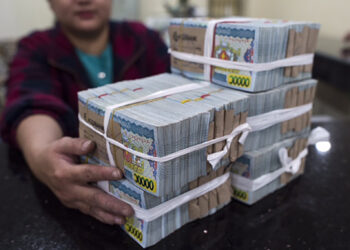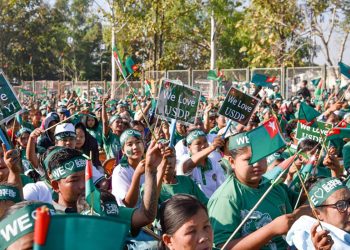Cutting off the Myanmar junta’s financial lifelines with sanctions against the Central Bank of Myanmar (CBM) and other institutions it relies on for its global transactions tops recommendations in a new report by an economic expert.
In the report published by the Special Advisory Council for Myanmar (SAC-M), economist Sean Turnell emphasizes that cutting off the junta’s funding is crucial to weakening its grip on power and paving the way for a democratic Myanmar.
Turnell, a former economic advisor to State Counselor Daw Aug San Suu Kyi, points out that the military has long entrenched itself in Myanmar’s financial system.
“For Myanmar’s military rulers, getting money of some form has never been a problem,” he writes. “In control of the central bank for most of the last seven decades, Myanmar’s military has enjoyed complete discretion over [its] own budget. What the military wants in budget allocations, it typically gets.”
Since the coup in 2021, it has taken full control of state-owned enterprises, the central bank, foreign exchange rates, and military-aligned banks to facilitate money laundering, weapons procurement, and illicit transactions.
This economic dominance allows the junta to fund its war efforts and suppress opposition, not least by launching airstrikes against civilians in resistance strongholds.
Expanding and strengthening sanctions
To break this “nexus,” Turnell calls for broader international sanctions targeting the CBM to restrict its ability to conduct transactions internationally, thereby paralyzing military spending.
That means global blacklisting of Myanmar’s state-owned and crony banks to cut off the junta’s access to international markets, including arms procurement. After U.S. sanctions on the state-owned Myanmar Investment and Commercial Bank (MICB) and the Myanmar Foreign Trade Bank (MFTB) in 2023, the junta simply switched to another state-owned bank, the Myanmar Economic Bank (MEB), for its international transactions.
In addition to arms procurement, the MEB also became the appointed vehicle for the inflow of foreign-exchange earnings of state-owned enterprises and the payment and receipt of government charges and taxes, the report says.
Turnell urges countries that already impose sanctions to coordinate their actions “to ensure consistency and to close loopholes for the junta to exploit.”
“To this end, sanctioning the Myanmar Economic Bank should be a priority, as should freezing any assets of the CBM held in offshore accounts,” he adds.
The author also suggests secondary sanctions like penalties on foreign institutions that facilitate military transactions, which could pressure countries like China, Russia, and Thailand to limit financial dealings with the junta.
“These and other simple but effective measures would have a real impact in disrupting the junta’s ability to commit atrocities against the Myanmar people,” he writes.
‘Odious debt’
The report urges international governments to designate all loans and debts accumulated by the junta as “odious debt”—a concept that means they are not enforceable against any civilian government that might follow the junta, but rather considered the personal debt of the current illegitimate government.
This would make them unattractive to lenders, who cannot be sure that the debt would ever be honored, so they are more likely to refuse to lend the regime money.
Turnell said the advantages of declaring the regime’s debt odious are at least twofold in terms of curtailing the harm inflicted on the suffering population.
“Firstly, by denying funding for the acquisition of the weapons themselves. Secondly, by not creating a debt burden for the population of a country to live under, however acquired.”
Dismantling military businesses
The report also calls for seizing military-owned properties and assets worldwide, while sanctioning individuals and companies that engage in business with the military-owned Myanmar Economic Holdings Limited (MEHL) and Myanmar Economic Corporation (MEC).
They provide billions in revenue for the junta. Disrupting these income streams would directly impact its operational capacity, limiting its ability to sustain prolonged conflict, the report says.
Redistributing Frozen Assets
Following the coup, the U.S. froze over $1 billion in Myanmar’s foreign reserves held in the Federal Reserve Bank of New York, where they have been accruing interest since the coup began. The report recommends following precedents in Afghanistan and Venezuela, where frozen assets were redirected to legitimate opposition groups—for example by funding Myanmar’s opposition, humanitarian efforts, and future reconstruction.
“These funds belong to the Myanmar people,” SAC-M’s Chris Sidoti said.
He said the U.S. government should transfer them to the legitimate representatives of the Myanmar people—the National Unity Government and ethnic resistance organisations—so they can be used to provide urgently needed humanitarian and development assistance to tens of millions in need.

















